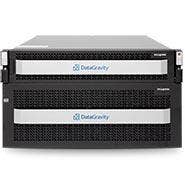DataGravity Gets $50M Funding For Data-Aware Storage Platform

DataGravity this week unveiled a new round of funding that brought the maker of data-aware storage platforms an additional $50 million to develop field operations and better engage channel partners.
The new funding round gives DataGravity, which in August came out of stealth, a total funding of $92 million, said Paula Long, CEO and co-founder of the Nashua, N.H.-based company.
DataGravity's platform, the DataGravity Discovery Series, helps customers manage their data and analyze it for business purposes.
[Related: DataGravity Exits Stealth To Add Intelligence, Data Protection To Storage]
The DataGravity Discovery Series appliances provide search and discover capabilities on data, as well as information on who accesses it and when. They are focused on unstructured data across CIFS, NFS and iSCSI data stores.
The appliances are available in 48-TB and 96-TB versions with flash storage acceleration optimization.They provide information discovery by conducting searches natively at the point at which data is stored, and include data protection via snapshots of block, file and virtual machine data.
DataGravity has taken a 100 percent channel approach to its market, Long told CRN. "We will be using the funding to bring on new account executives and systems engineers to help partners in the field," she said. "We started shipping on Oct. 6. Our first customers were identified through channel partners. We are pleased [with] how our channel is working with us."
John Joseph, DataGravity president and co-founder, told CRN the vendor will invest heavily in channel support.
"A lot of partners asked for, and we provided, customer support that is co-located with our development team," Joseph said. "Partners get increased customer satisfaction. We get the engineering team closer to the customers, and the support teams closer to the developers. It's similar to what we did with EqualLogic, where we got very high customer satisfaction."
That reference to EqualLogic is key to understanding DataGravity's approach to the channel. Both Long and Joseph were also co-founders of EqualLogic before that company's 2008 acquisition by Dell. The acquisition of EqualLogic gave Dell a channel base that it has since expanded significantly.
DataGravity has done a good job of living up to its promises in both technology and channel terms, said Joe Paquet, vice president of vendor alliances at Axis Business Solutions, a Portsmouth, N.H.-based solution provider and DataGravity channel partner.
NEXT: DataGravity's Focus On The Channel

Paquet, whose company started working with DataGravity early this year because of its relationship with the founders from their EqualLogic days, told CRN that since the company released its first appliances, everything he thought about the company has been validated.
"We include them in our go-to-market strategy and our long-term plans," he said. "We interact with them almost every day."
Paquet said most of the traction he has seen for the DataGravity Discovery Series has been in legal and education customers, and in some health-care customers.
One of his customers, a law firm, was looking to consolidate five or six legal discovery solutions, and chose DataGravity. "They can now do keyword searches, private information searches and compliance audits, things they couldn't do before with their existing storage. We displaced a competing Dell EqualLogic solution. But the customer is still an EqualLogic customer. We didn't have to rip-and-replace the existing storage infrastructure."
The $92 million that DataGravity has banked from investors so far is not expected to get the company to a cash-flow basis by choice, Long said.
"Getting to cash-flow positive depends on how rapidly we want to grow," she said. "With EqualLogic, we were all about growth and profitability. Today, we're more focused on growth. We are totally focused on accumulating happy customers. So it depends on how fast we move and how fast customers switch to data-aware storage."
PUBLISHED DEC. 10, 2014